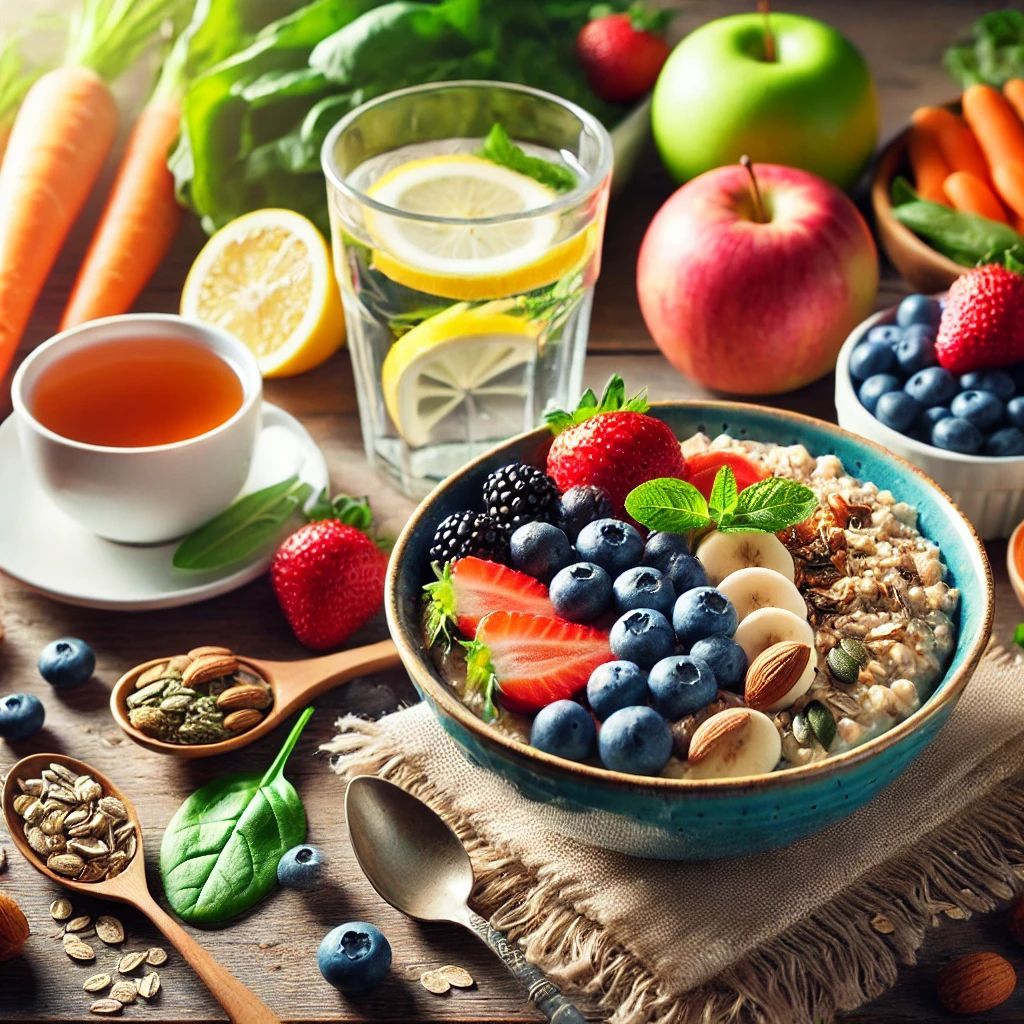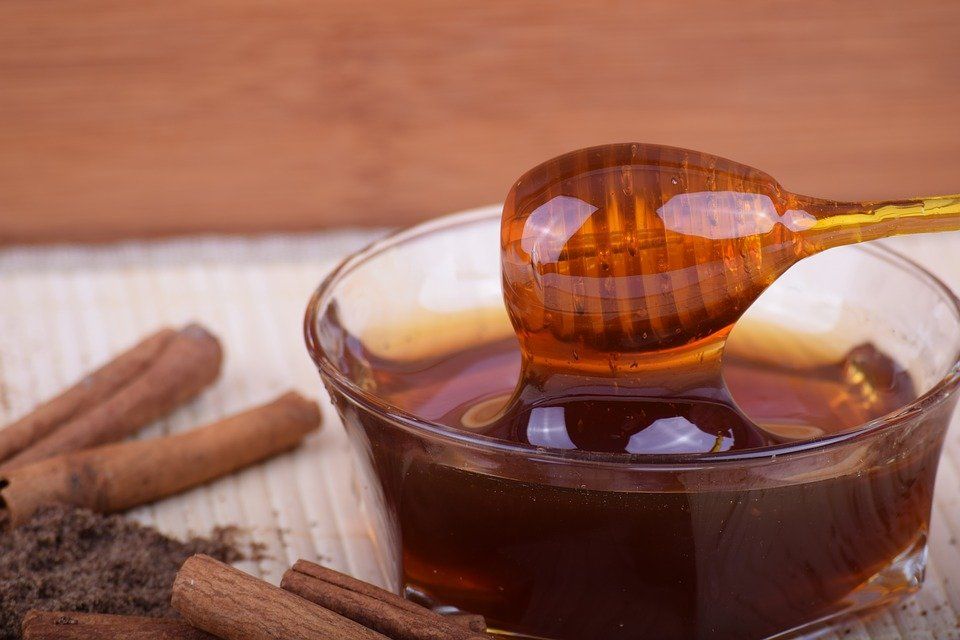Superfoods - 15 foods that contribute to health
Tanja Begerack • 23. November 2020
Vitamins & Nutrients from Nature
Avocados
Consuming avocados can provide numerous health benefits. Avocados are rich in fiber, vitamins, and minerals, particularly potassium, vitamin K, vitamin E, vitamin C, B vitamins, and folic acid. Additionally, they contain healthy fats that may help lower cholesterol levels and reduce the risk of heart disease.
The fiber in avocado flesh can help regulate digestion and increase satiety, which can contribute to maintaining or even reducing body weight. The vitamins and antioxidants present in the fruit also support the immune system and may help reduce inflammation in the body.
Consuming avocados can provide numerous health benefits. Avocados are rich in fiber, vitamins, and minerals, particularly potassium, vitamin K, vitamin E, vitamin C, B vitamins, and folic acid. Additionally, they contain healthy fats that may help lower cholesterol levels and reduce the risk of heart disease.
The fiber in avocado flesh can help regulate digestion and increase satiety, which can contribute to maintaining or even reducing body weight. The vitamins and antioxidants present in the fruit also support the immune system and may help reduce inflammation in the body.
In addition to the health benefits, consuming avocados can also help promote a balanced diet, especially for vegetarians or vegans who may struggle to get enough healthy fats and nutrients.
Mangos
Mangos can have a positive effect on health. They are rich in vitamin C, vitamin A, folic acid, and fiber. Vitamin C is an antioxidant that can help strengthen the immune system and reduce inflammation in the body. Vitamin A supports skin and eye health. Folic acid is an important nutrient for pregnant women as it contributes to fetal development. Fiber is important for digestion and can help reduce the risk of cardiovascular disease and diabetes. In addition, mangos also contain certain compounds, such as polyphenols and carotenoids, which have antioxidant and anti-inflammatory properties and can contribute to overall health.
Chia Seeds
Chia seeds are small, nutrient-rich seeds that come from the plant Salvia hispanica. They are considered a superfood because they contain many important nutrients that can contribute to promoting health.
Chia seeds are rich in fiber, protein, omega-3 fatty acids, and antioxidants. These nutrients can help regulate blood sugar, lower cholesterol levels, and reduce the risk of heart disease and diabetes. In addition, the fiber and protein in chia seeds can help create a long-lasting feeling of fullness, which can help reduce hunger and support weight loss.
Chia seeds can be integrated into the diet in various ways, such as an ingredient in smoothies, yogurt, or cereal, or as a substitute for eggs in vegan baking recipes. Since chia seeds can absorb a lot of water, they should be soaked before consumption to avoid swelling in the stomach.
Although chia seeds have many health-promoting properties, they should still be consumed in moderation as they also have a high calorie count. It is generally recommended not to consume more than 1-2 tablespoons of chia seeds per day to benefit from the health advantages without exceeding the calorie budget.
Mangos can have a positive effect on health. They are rich in vitamin C, vitamin A, folic acid, and fiber. Vitamin C is an antioxidant that can help strengthen the immune system and reduce inflammation in the body. Vitamin A supports skin and eye health. Folic acid is an important nutrient for pregnant women as it contributes to fetal development. Fiber is important for digestion and can help reduce the risk of cardiovascular disease and diabetes. In addition, mangos also contain certain compounds, such as polyphenols and carotenoids, which have antioxidant and anti-inflammatory properties and can contribute to overall health.
Chia Seeds
Chia seeds are small, nutrient-rich seeds that come from the plant Salvia hispanica. They are considered a superfood because they contain many important nutrients that can contribute to promoting health.
Chia seeds are rich in fiber, protein, omega-3 fatty acids, and antioxidants. These nutrients can help regulate blood sugar, lower cholesterol levels, and reduce the risk of heart disease and diabetes. In addition, the fiber and protein in chia seeds can help create a long-lasting feeling of fullness, which can help reduce hunger and support weight loss.
Chia seeds can be integrated into the diet in various ways, such as an ingredient in smoothies, yogurt, or cereal, or as a substitute for eggs in vegan baking recipes. Since chia seeds can absorb a lot of water, they should be soaked before consumption to avoid swelling in the stomach.
Although chia seeds have many health-promoting properties, they should still be consumed in moderation as they also have a high calorie count. It is generally recommended not to consume more than 1-2 tablespoons of chia seeds per day to benefit from the health advantages without exceeding the calorie budget.
Pomegranate:
Pomegranates are rich in antioxidants, vitamin C, potassium, and fiber. They possess strong anti-inflammatory properties and can reduce the risk of various diseases, including heart disease and cancer. Regular consumption of pomegranate juice can improve blood pressure levels and promote circulation.
Lemon and its peel (untreated/non-sprayed):
Lemon and its peel (untreated/non-sprayed):
Lemons are an excellent source of vitamin C and enhance immune function. The peel contains high amounts of D-limonene, a terpene with antioxidant properties that supports liver health. Using untreated lemon peel can also improve nutrient absorption and offers additional health benefits, such as promoting digestive health.
Ginger:
Ginger:
Ginger is known not only for its anti-inflammatory and antioxidant properties but also for its role in alleviating stomach discomfort and digestive disorders. The gingerols contained in ginger can help reduce pain and stiffness in muscles and joints. Additionally, ginger has a warming effect that can stimulate metabolism and aid in weight management.
Turmeric:
Turmeric:
Curcumin, the active ingredient in turmeric, has proven neuroprotective and cardioprotective properties. It supports brain health and can reduce the risk of heart diseases, as well as prevent inflammatory processes and oxidative damage at the cellular level. Turmeric can also improve symptoms of arthritis and contribute to the relief of chronic pain.
Spinach:
Spinach:
Spinach is particularly nutrient-rich and supports a variety of body functions. The antioxidants it contains, such as lutein and zeaxanthin, are essential for eye health and can protect against age-related macular degeneration. Spinach also promotes blood health through iron and aids in energy production through magnesium.
Blueberries:
Blueberries:
These small berries are powerful stores of antioxidants that can protect the brain from degeneration and improve cognitive function. The high levels of flavonoids in blueberries have had a positive effect on the cardiovascular system by lowering blood pressure and improving the elasticity of blood vessels.
Nuts and Seeds:
Nuts and Seeds:
Walnuts, almonds, and flaxseeds are not only rich in healthy fats and protein but also in fibers that promote digestion and provide a longer feeling of satiety. Regular consumption can contribute to lowering LDL cholesterol and reducing the risk of heart diseases.
Salmon:
Salmon:
As one of the best sources of omega-3 fatty acids, salmon not only supports heart health but also positively affects brain function and can reduce the risk of depression. Vitamin D in salmon strengthens bones and the immune system.
Sweet Potatoes:
Sweet Potatoes:
Their high content of beta-carotene, which is converted into vitamin A in the body, supports not only the immune system and skin health but also vision. In addition, sweet potatoes are a good source of fiber, contributing to the maintenance of a healthy digestive system.
Disclaimer:
Please note that the information and insights shared on this blog about nutrients and their impact on health are of a general nature and are not intended to replace professional medical advice, diagnoses, or treatments. The effects of foods and nutrients can vary individually, and what may be beneficial for one person may not be for another. It is recommended to consult a qualified healthcare provider for specific health concerns or questions regarding your diet.
The information on this blog is based on current scientific knowledge and studies at the time of publication. However, science is constantly evolving, and new research findings can lead to new insights. Therefore, both the author and the operator of this blog assume no responsibility for the currency, correctness, completeness, or quality of the information provided.
All statements and views expressed here are for educational purposes only and are intended to encourage readers to think more consciously about their diet and health. I encourage all readers to make health-related decisions in consultation with medical professionals.
By using this blog, you acknowledge that you take responsibility for your own health and well-being and that both the author and the operator of this blog assume no liability for any disadvantages that may arise from the application of the information shared here.
Please note that the information and insights shared on this blog about nutrients and their impact on health are of a general nature and are not intended to replace professional medical advice, diagnoses, or treatments. The effects of foods and nutrients can vary individually, and what may be beneficial for one person may not be for another. It is recommended to consult a qualified healthcare provider for specific health concerns or questions regarding your diet.
The information on this blog is based on current scientific knowledge and studies at the time of publication. However, science is constantly evolving, and new research findings can lead to new insights. Therefore, both the author and the operator of this blog assume no responsibility for the currency, correctness, completeness, or quality of the information provided.
All statements and views expressed here are for educational purposes only and are intended to encourage readers to think more consciously about their diet and health. I encourage all readers to make health-related decisions in consultation with medical professionals.
By using this blog, you acknowledge that you take responsibility for your own health and well-being and that both the author and the operator of this blog assume no liability for any disadvantages that may arise from the application of the information shared here.

Discover how small dietary changes can lead to greater energy and well-being. This blog post explains how healthy eating is easy to incorporate into everyday life and why it has a positive impact on both body and mind over the long term.
balanced nutrition, breakfast ideas, mental strength, oatmeal with fruits, nutrient-rich meals, healthy eating tips, boost well-being, healthy lifestyle, nutrition advice, energy boost, simple recipes, healthy breakfast, healthy living

In this insightful post, we explore the spiritual meaning of dreams and their role in our consciousness. Discover how dreams serve as a bridge between our subconscious and the spiritual realm, and learn practical tips for interpreting dreams and enhancing dream recall to deepen your spiritual journey.

Recently, I stumbled upon the impressive health benefits of millet, a grain that is often overlooked in our modern diet. This discovery inspired me to delve deeper into millet and its numerous positive impacts on our health. What I found is truly fascinating and deserves to be shared with you. Millet stands out among grains thanks to its rich composition of essential nutrients: B-complex vitamins, vitamin C, beta-carotene, and a wealth of minerals and trace elements, making it an excellent source of iron, especially for vegetarians and vegans. The Nutrient Powerhouses in Millet The various types of millet offer a remarkable density of minerals such as fluorine, potassium, magnesium, phosphorus, and sulfur. Notably, it has a high content of silicon (silicic acid), iron, and vitamin B6, setting millet apart from other grains. This abundance of nutrients not only makes millet easily digestible and tolerable but also a strong ally in combating stomach and intestinal problems, gallstones, and in strengthening the immune system. Its anti-inflammatory, detoxifying, and overall strengthening properties make it a valuable component of a healthy diet. Millet and Its Beauty Secrets It's no longer a secret that millet contributes to the beauty of the skin, hair, and nails. The Karlsruhe Skin Clinic has even shown that millet extract can promote the growth phase of hair, making it a valuable aid in the fight against hereditary hair loss. Versatility and Tradition Millet, one of the world's oldest gluten-free foods, was once a main food source in Europe before being gradually displaced by potatoes and maize in the 17th century. Today, we're rediscovering its versatility and its role as an ancient medicinal plant in traditional folk medicine. Caution with Millet Consumption Despite its many benefits, millet contains dhurrin, which can release cyanide and could interfere with iodine metabolism. Therefore, it is advisable, especially for those with hypothyroidism, to discuss millet consumption with a doctor. However, the rapeseed millet cultivated in Europe contains significantly less dhurrin, especially the yellowish varieties like golden millet. The Many Faces of Millet Millet comes in numerous varieties, each with its own unique benefits. The differences range from color and taste to specific health benefits. However, all are gluten-free and offer a rich palette of nutrients. Conclusion The rediscovery of millet as a super grain and its diverse health benefits show how valuable the wisdom of ancient cultures can be for our modern world. Millet definitely deserves a fixed place in our diet - not only for its nutrients but also as a source of strength for beauty and health. I hope these insights into the world of millet inspire you to integrate this versatile and healthy grain into your diet. Discover the ancient wisdom and the modern health benefits millet has to offer. Disclaimer for Posts on Millet and Its Effects: Please note that the information shared on this blog about millet and its health effects is of a general nature and is not intended to substitute for professional medical advice, diagnoses, or treatments. The effects of millet can vary individually, and what may be beneficial for one person may not apply to another. It is recommended to consult a qualified healthcare provider for specific health concerns or questions regarding the use of millet. The information on this blog is based on the current scientific knowledge and studies at the time of publication. However, science is always advancing, and new research may lead to new insights. Therefore, both the author and the operator of this blog assume no responsibility for the currency, accuracy, completeness, or quality of the information provided. All statements and views expressed here are solely for educational purposes and are intended to encourage readers to think more consciously about the use of millet and health. We encourage all readers to make health-related decisions in consultation with medical professionals. By using this blog, you acknowledge that you take responsibility for your own health and well-being and that both the author and the operator of this blog assume no liability for any disadvantages that may arise from the application of the information shared here about millet.

Discover the powerful benefits of Manuka honey, a unique product from New Zealand's tea tree nectar. Used for centuries by the Maori for its healing properties, Manuka honey offers antibacterial, antiviral, and antifungal effects. Explore its uses for skin conditions, wound healing, immune support, and more.




